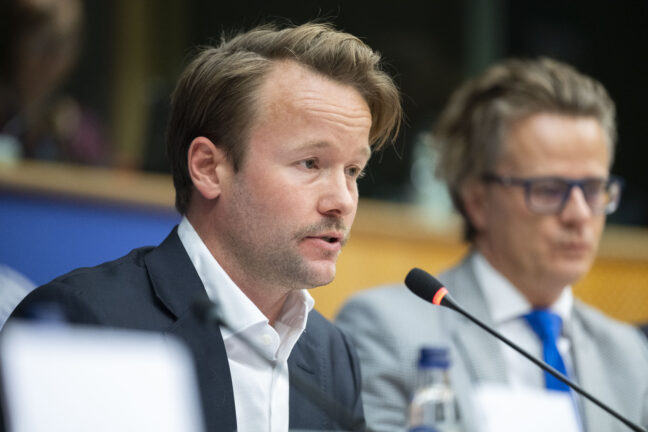Europe’s startup community is growing uneasy. The European Commission hopes for its long-awaited 28th regulatory regime for innovative companies to deliver a single-market breakthrough. But Brussels’ perceived inability to push through a binding regulation makes founders fear it could become yet another layer of fragmentation.
The problem is, the Commission is reportedly considering proposing the regime as a directive instead of a regulation. For MEP Reinier van Lanschot (Greens-EFA/NLD), who has been travelling across member states to speak directly with founders, the message is strikingly consistent. If Brussels opts for a directive, the ‘EU-Inc regime’ risks becoming almost irrelevant.
Mr van Lanschot has visited Berlin, Amsterdam, Paris, Helsinki and other tech hubs to gather first-hand testimonies. The purpose, he says, is simple: “Too often, the legislation we make here in the European Parliament misses its connection with reality,” he told EU Perspectives. “And this is one of those moments where getting it wrong would have real economic consequences.”
He is talking about the so-called 28th regime: a unified, optional set of rules covering areas such as company law, labour law, taxation, and insolvency that would allow firms to operate across the EU without navigating 27 different national systems.
You might be interested
A market of 27 realities
For many founders, expanding beyond their home country remains a bureaucratic maze. The hurdles span labour law, taxation, corporate forms, employment rules, and stock-option taxation. “My brother runs a fintech startup,” Mr van Lanschot explains. “Every time the company enters a new market, it’s piles of paperwork. That’s a huge extra barrier. And every country has its own version of it.”
The consequences are palpable. “The absurd thing,” the Dutch member said, “is that for a successful Dutch startup, it can be more attractive to scale up in the United States than in Germany, Belgium or France. That’s happening because we lack a true EU-level framework.”
The costs can be prohibitive even for organisations that are not commercial. Mr Van Lanschot recalls his own pan-European party, Volt, running into this problem when it tried to hire staff across different EU countries. “By the time we hired our eighth person, we were paying almost the same amount in consultancy fees, labour-law advice, tax compliance, payroll support, as we paid in salary. That’s simply impossible for most small organisations.”
Opacity around stock-option taxation further hampers recruitment. Early-stage employees often join startups based on the promise of ownership, but European tax rules frequently impose charges long before that value materialises. “We’re basically taxing future potential before it exists,” he says. “That makes it harder to attract the kind of talent willing to take risks.”
Directive vs. regulation
The leaked version of the Commission’s upcoming work programme indicates that the 28th regime may take the form of a directive, a choice that has alarmed founders. Unlike a regulation, a directive must be transposed into national law; but it may be done so in 27 different ways.
“If you choose a directive,” Mr van Lanschot warns, “you immediately reintroduce 27 national differences. Startups want fewer divergences, not more. You don’t solve fragmentation by creating 27 new versions of a supposed single rule.”
Some policymakers argue that unanimity requirements in the Council make a regulation politically unrealistic, and that a directive—requiring only a qualified majority—is the viable realistic option. Mr Van Lanschot rejects this logic: “A regulation is the only way to set a real standard. Otherwise we’ll spend years creating something that companies won’t use.”
Labour standards and fears of deregulation
When asked whether a directive could still offer meaningful improvement, he remains sceptical. “Maybe a few companies would benefit, especially if neighbouring countries implement it similarly. But it wouldn’t be the transformative shift we need to become competitive. In practice, it becomes almost irrelevant.”
Some warn that a unified European legal structure could spark a “race to the bottom” in labour protections. While the Dutch Green MEP acknowledges the concern, he argues that the risk can be managed through clear safeguards. “For the very early start-up phase, you can have some flexibility,” he says. “But once a company grows or reaches a certain age, it should meet the same European labour standards we already have. If an established company opts into the opts into the EU-Inc regime, those rules should simply apply.”
In five years we’ll look back and say far too little was done (on the Draghi report). What’s missing is political will. — MEP Reinier van Lanschot (Greens-EFA/NLD)
He emphasises that weakening protections is neither the intention nor the necessity: “We can incorporate the safeguards directly into the 28th regime. Innovation and strong worker rights are not mutually exclusive. We believe climate goals and economic competitiveness go hand in hand. The Draghi report makes that very clear: investment in clean energy, a capital markets union, predictable legislation —all of that boosts competitiveness.”
Cautious optimism
Mr van Lanschot offers as much realism as hope. The Draghi report laid out 380 recommendations; only around 10 percent have been implemented. “If we continue at this pace,” he says, “in five years we’ll look back and say far too little was done. What’s missing is political will.”
He sees the main obstacle not in technical complexity, but in entrenched national reflexes. “Governments say: sure, let’s have one European standard, so long as it’s our national standard. That kind of nationalistic thinking limits Europe’s economic potential.”
Yet he remains cautiously optimistic: “Optimism is almost a duty in politics. But the urgency is real. Losing economic relevance means losing the ability to finance our security, our freedoms, our climate transition. If we want Europe to stay a place where startups choose to grow, then we need the courage to act now.”











